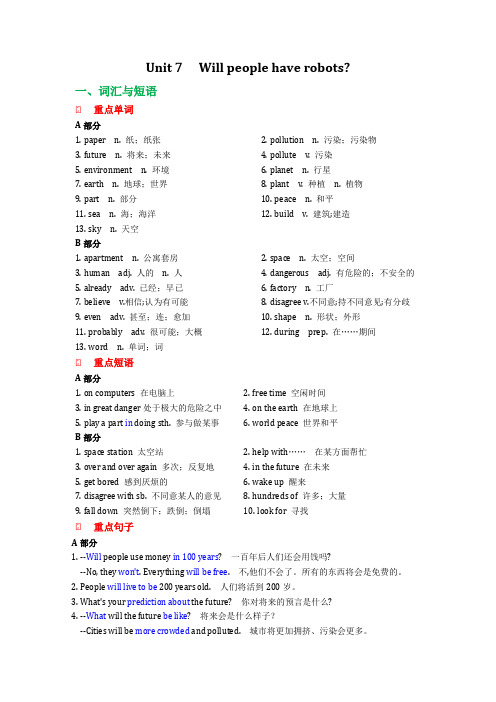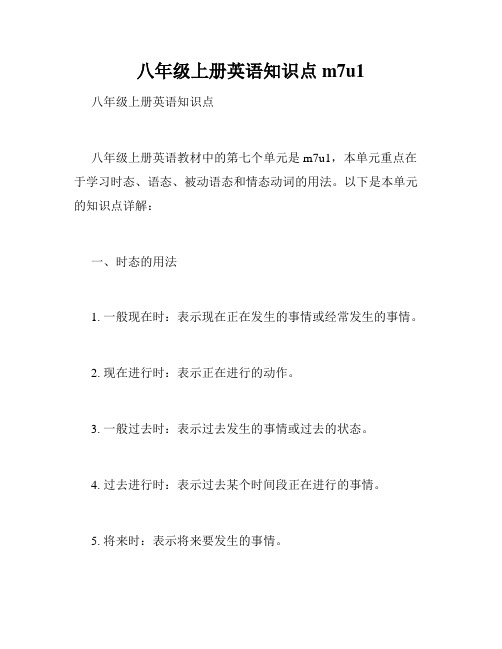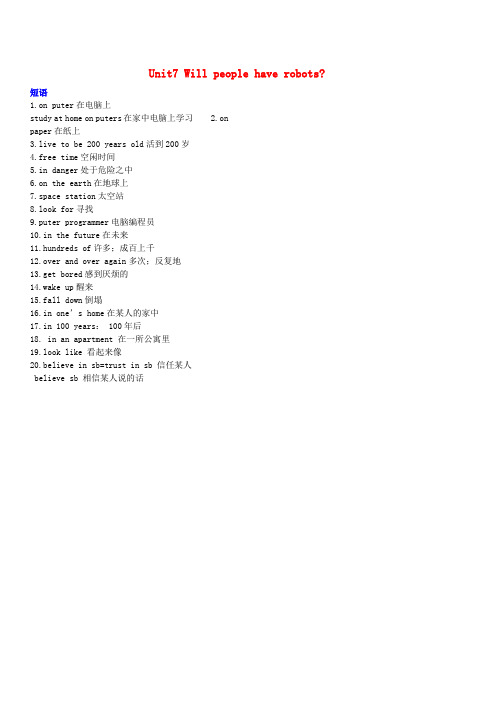八年级英语上第七单元知识点
人教版八年级上册英语 Unit 7单元知识点总结

人教版八年级上册英语Unit 7单元知识点总结Unit 7 Will people have robots?知识点1. Do you think…? 你认为……?后常接宾语从句,宾语从句要用陈述句的语序。
例:Do you think there will be more pollution in the future?宾语从句特殊疑问词+ do you think+陈述语序2.paper纸不可数名词一张纸a piece of paper报纸,论文,试卷可数名词3. live to be + 年龄= live to +年龄= live the age of + 年龄活到多少岁live to do sth. 为做某事而活着。
后面的不定式表目的。
live v. 第三人称单数lives /liviz/;life n. 复数形式lives /laivz/living adj. 活着的作定语和表语alive adj. 活着的只作表语例:a living man (定语) The man is living (表语,放在be动词后面) The man is alive (表语)4. in 100 years 在100年以后in + 一段时间在……之后一般将来时,对其提问用how soon (多久)5. part n. 参加,参与;部分take part in = join in 参加play a part in sth./ doing sth. 参与到……中去;在……中扮演着……的角色6. human n. 人复数(pl.) humansadj. human being =humanperson 个体的人,有单复数形式,“一个人”只能说“a person”,不能说“a people”。
people 人,人们集体,为一个集合名词;也可作“民族”,此时有单复数,a people 指“一个民族”,所以它的复数就是“peoples”。
八年级上册英语第七单元知识点

八年级上册英语第七单元知识点八年级上册英语第七单元的知识点主要包括以下内容(具体内容可能因不同版本的教材而有所差异):
一、词汇
学习并掌握本单元的新单词、短语及其用法,如有关描述人物特征、个性、习惯等方面的词汇。
二、语法
1. 比较级和最高级:本单元可能会重点讲解形容词和副词的比较级和最高级的构成及用法,包括规则变化和不规则变化。
2. 一般现在时:复习和巩固一般现在时的用法,特别是第三人称单数的动词变化。
3. 情态动词:可能会涉及情态动词如should, could, might等的用法。
三、句型
1. 学习并掌握本单元的重点句型,特别是与人物描述、比较、建议等相关的句型。
2. 掌握如何用英语描述人的外貌、性格、能力等。
四、阅读
通过阅读本单元的课文,提高阅读理解能力,学习如何获取文章中的关键信息,并理解文章的主旨大意。
五、写作
学习如何用英语写一篇描述人物的文章,包括描述人物的外貌、性格、爱好、习惯等方面。
六、听力和口语
通过听力和口语练习,提高听懂和用英语描述人物的能力,包括听懂有关人物描述的对话和短文,以及能够用英语进行简单的人物描述。
请注意,以上只是可能的知识点概述,具体的学习内容应以您所使用的教材为准。
建议您参考教材、教辅资料或咨询教师以获取更详细和准确的信息。
最全面人教版八年级上册英语第七单元知识点归纳总结

Unit 7 Will people have robots?一、词汇与短语● 重点单词A部分1.paper n. 纸;纸张2.pollution n. 污染;污染物3.future n. 将来;未来4.pollute v. 污染5.environment n. 环境6.planet n. 行星7.earth n. 地球;世界8.plant v. 种植n. 植物9.part n. 部分10.peace n. 和平11.sea n. 海;海洋12.build v. 建筑;建造13.sky n. 天空B部分1.apartment n. 公寓套房2.space n. 太空;空间3.human adj. 人的n. 人4.dangerous adj. 有危险的;不安全的5.already adv. 已经;早已6.factory n. 工厂7.believe v.相信;认为有可能8.disagree v.不同意;持不同意见;有分歧9.even adv. 甚至;连;愈加10.shape n. 形状;外形11.probably adv. 很可能;大概12.during prep. 在……期间13.word n. 单词;词● 重点短语A部分1.on computers 在电脑上2.free time 空闲时间3.in great danger处于极大的危险之中4.on the earth 在地球上5.play a part in doing sth. 参与做某事6.world peace 世界和平B部分1.space station 太空站2.help with……在某方面帮忙3.over and over again 多次;反复地4.in the future 在未来5.get bored 感到厌烦的6.wake up 醒来7.disagree with sb. 不同意某人的意见8.hundreds of 许多;大量9.fall down 突然倒下;跌倒;倒塌10.look for 寻找● 重点句子A部分1.--Will people use money in 100 years? 一百年后人们还会用饯吗?--No, they won't. Everything will be free. 不,他们不会了。
八年级上册英语第7单元笔记

八年级上册英语第7单元笔记以下是八年级上册英语第7单元的笔记,主要包括重点单词、短语、句型和语法知识点。
重点单词:1. ability 才能,能力2. achieve 获得,实现3. also 也,同样4. although 尽管,虽然5. always 总是,一直6. another 再一个,另一个7. as 作为,如同8. because 因为9. become 变成,成为10. before 在……之前重点短语:1. be able to 能够,有能力2. be afraid of 害怕3. because of 因为,由于4. become famous 变得出名5. make a decision 下定决心6. the ability to do sth 做某事的能力7. achieve one’s dreams 实现梦想8. be interested in 对……感兴趣9. before long 不久之后10. as long as 只要重点句型:1. Although he is young, he knows a lot. 尽管他很年轻,但他知道很多。
2. I want to be a teacher because I enjoy working with young people. 我想成为一名老师,因为我喜欢和年轻人一起工作。
3. I am also interested in science and enjoy doing experiments in the lab. 我也对科学感兴趣,喜欢在实验室里做实验。
4. Before long, he became one of the most popular writers in China.不久之后,他成为中国最受欢迎的作家之一。
5. As long as you try your best, you will be successful in the end. 只要你尽力而为,最终你会成功的。
八年级上册第七单元英语笔记

八年级上册第七单元英语笔记
一、重点词汇
1. ability 能力
2. difficult 困难的
3. different 不同的
4. important 重要的
5. impossible 不可能的
二、重点短语
1. be able to 能够
2. find out 查明
3. be different from 与……不同
4. have to 必须
5. the ability to do sth. 做某事的能力
三、重点句型
1. What’s the ability to do sth.? 做某事的能力是什么?
2. How difficult it is to do sth! 做某事多么困难!
3. It’s different from A to B. A和B是不同的。
4. You have to do sth. 你必须做某事。
5. I can’t do sth. 我不能做某事。
四、重点语法
情态动词can的用法:can表示能力,意为“能够”。
其否定形式是can’t,意为“不能”。
can还用于推测,意为“可能”,常用于肯定句中。
情态动词can的用法是我们这个单元的重点之一,同学们一定要掌握。
五、拓展知识
1. 表示能力常用的词还有:be able to、can、be able to do、be capable of doing等。
2. 表示困难常用的词还有:difficult、hard、difficulty等。
3. 表示不同常用的词还有:be different from、differ from等。
八年级上册英语知识点m7u1

八年级上册英语知识点m7u1八年级上册英语知识点
八年级上册英语教材中的第七个单元是m7u1,本单元重点在于学习时态、语态、被动语态和情态动词的用法。
以下是本单元的知识点详解:
一、时态的用法
1. 一般现在时:表示现在正在发生的事情或经常发生的事情。
2. 现在进行时:表示正在进行的动作。
3. 一般过去时:表示过去发生的事情或过去的状态。
4. 过去进行时:表示过去某个时间段正在进行的事情。
5. 将来时:表示将来要发生的事情。
二、语态的用法
1. 主动语态:表示主语在进行动作。
2. 被动语态:表示主语被动地接受动作。
三、被动语态的构成
被动语态的构成是由“be”动词加上过去分词。
四、情态动词的用法
情态动词是用来表示说话人的态度或说话人认为的可能性、建议、能力等的词语。
1. can和could表示能力。
2. may和might表示可能性。
3. must表示肯定性。
4. should表示建议。
五、注意事项
1. 情态动词后面接动词原形。
2. 被动语态中的主语是接受动作的人或事物。
3. 变化型的动词在时态、语态和被动语态上有明显的变化。
以上是八年级上册英语m7u1的重点知识点,需要同学们在学习的过程中认真掌握,加强练习,加深理解,才能够在英语学习中进一步提高水平。
八年级英语上册Unit7Willpeoplehaverobots知识点归纳(新版)

Unit7 Will people have robots?短语1.on puter在电脑上study at home on puters在家中电脑上学习 2.onpaper在纸上3.live to be 200 years old活到200岁4.free time空闲时间5.in danger处于危险之中6.on the earth在地球上7.space station太空站8.look for寻找9.puter programmer电脑编程员10.in the future在未来11.hundreds of许多;成百上千12.over and over again多次;反复地13.get bored感到厌烦的14.wake up醒来15.fall down倒塌16.in one’s home在某人的家中17.in 100 years: 100年后18. in an apartment 在一所公寓里19.look like 看起来像20.believe in sb=trust in sb 信任某人believe sb 相信某人说的话用法:1.will+动词原形将要做……2.fewer/more+可数名词复数更少/更多……less/more+不可数名词更少/更多……3.have to do sth.不得不做某事(客观) must 必须(主观)5.There will be + 主语+其他将会有……6.There is/are +sb./sth.+doing sth.有……正在做某事7.make sb. do sth. 8.help sb. with sth.帮助某人做某事9.What will the future be like ? 未来将会是什么样子?10.Which side do you agree with ?你同意哪一方的观点?。
人教版八年级上册英语第七单元Unit7《重要知识点》汇总总结

人教版八年级上册英语第七单元Unit7《重要知识点》汇总总结UNIT 7 Will people have robots?Section A(1a-3c)重点短语1. in the country 在农村2. play a part 参与;发挥作用3. free time 空闲时间4. in great danger 处于极大的危险之中5. live to be... 活到……6. in the future 未来;在将来7. on computers 在电脑上8. do the same job (s) 做同样的工作9. on the earth 在地球上10. in 100 years 在一百年以后11. save the earth 拯救地球12. world peace 世界和平重点句型1. Do you think there will be robots in people’s homes? 你认为人们家里将会有机器人吗?2. What will the future be like? 未来将会是什么样子?3. Everyone should play a part in saving the earth. 人人都应该在拯救地球中尽一份力。
4. —Will there be world peace? 将有世界和平吗?—Yes, I hope so. 是的,我希望如此。
5. Will we have to move to other planets? 我们将不得不搬到其他星球吗?Section B(1a-Self Check)重点短语1. look for 寻找2. over and over again多次;反复地3. look like看起来像4. the same as…和……一样5. hundreds of许多;大量6. wake up醒来;叫醒7. disagree with sb. 不同意某人(的观点) 8. for example例如9. fall down突然倒下;跌倒;倒塌10. take a holiday 度假11. space station 太空站;宇宙空间站12. at some point 在某一时刻13. be no good for 对……没有好处14. on the weekend 周末重点句型1. Today there are already robots working in factories. 如今已经有机器人在工厂里工作了。
- 1、下载文档前请自行甄别文档内容的完整性,平台不提供额外的编辑、内容补充、找答案等附加服务。
- 2、"仅部分预览"的文档,不可在线预览部分如存在完整性等问题,可反馈申请退款(可完整预览的文档不适用该条件!)。
- 3、如文档侵犯您的权益,请联系客服反馈,我们会尽快为您处理(人工客服工作时间:9:00-18:30)。
Unit7 Will people have robots?
1.on computers在电脑上
2.on paper在纸上
3.live to be 200 years old 岁200到活空闲时间
4. free time 在地earth
5.in danger处于危险之中
6. on the
球上stationa part in sth参与某事 8.space 7.play 太空站电脑编for寻找 puter
programmer9.look
程员反again 12.over and over 11.in the future在未来复地up醒来感到厌烦的13.get bored 14.wake
倒塌看起来像15.look like 16. fall down will+动词原形构成一般将来时。
)一般将来时表示将来某个时间要发生的动作或存在的状态,也(1表示将来经常反复发生的动作,常与表示将来的时间状语连用。
如will+助动词等。
一般将来时由时间段tomorrow,next year,in+我明例句: I will go to the park tomorrow.构成。
动词原形
后面加)一般将来时的否定构成:天要去公园。
(2 在will\shall won't。
可缩写为。
notWill not其肯定回答为提到主语前面。
will\shall将变为一般疑问句:)3(.
Yes,主语眫汩?,否定回答为No,主语眫湯??。
句型
1.will+动词原形将要做……
2.fewer/more +可数名词复数更少/更多……
3.less/more+不可数名词更少/更多……
4.try to do sth尽力做某事
5.have to do sth不得不做某事
6..agree with sb同意某人的意见
7.such+名词如此……
8.play a part in doing sth参与做某事 9.make sb do sth让某人做某事
10.help sb with sth帮助某人某事
11.There will be +主语+其他将会有……
12.There is/are+sb./sth.+doing sth 有……正在做某事
13.It is +形容词+for sb +to do sth 做某事对某人来说是怎样的
14.Sb. spend some time/money (in) doing sth. Sb. spend some time/money on sth.
It takes sb some time/money to do sth.
15. hundreds of 许多、大量,与具体数字连用时,用单数且不与
of连用。
如:five hundred Thousand, million,billon与其用法相同
16.believe表示相信某人说的话 believe in相信某人的为人忘记做 forget doing sth忘记去做某事17. forget to do sth
了
()1. He ____ very busy this week, he ________ free next week.
A. will be; is
B. is; is
C. will be; will be
D. is;
will be ()2. --- Don't forget to ask him to write to me. --- I won't. As soon as he _____, I'll ask him to write
to you.
A. will come
B. came
C. comes
D. is coming
()3. Frank _____ to see his grandma if he _____ free tomorrow.
A. will come; will be
B. comes; is
C. will come; is
D. comes; will be
()4. There _______ robots in 100 years, I think.
A. will have
B. is going to have
C. be
D. are going
to be ()5. There _______ a talk on science in our school next Monday.
A. will give
B. will be
C. is going to give
D.
is
()6. —Will people live to be 300 years old?
—_________.
A. No, they aren't
B. No, they won't
C. No, they don't
D. No, they can't
()7. I will see you again _________.
A. a day
B. every day
C. one day
D. everyday
()8. --I don't know if it ______ tomorrow.
--The students will not go to the Summer Palace if it
___ tomorrow.
A. rains; will rain
B. rains; rains;
C. will rain; will rain
D. will rain; rains
1. They ____________ (not have) any classes next week.
2.Betty _____________ (write) to her parents tomorrow.
3.Look at those clouds. It ___________(rain).
4.He ____________ (read) an English book now.
5.Look! Many girls ______________(dance) over there.
6. If it ____ (be) fine tomorrow, I'll go with you.
7. If you put ice in a warm place, it______ (turn) into water.
8. If you cook a banana, it_________ (become) very soft.。
